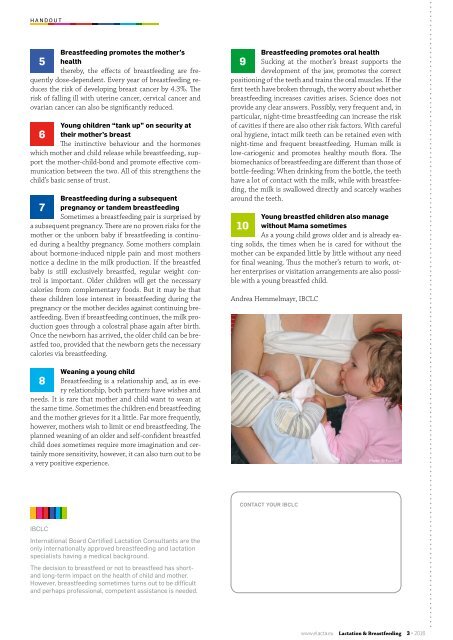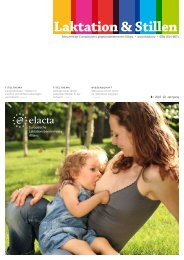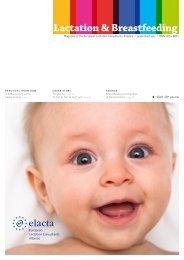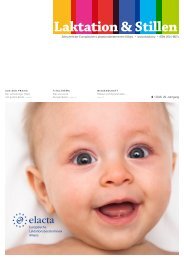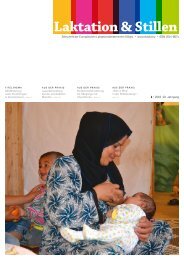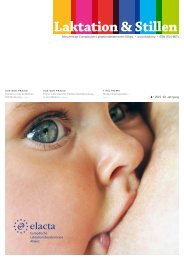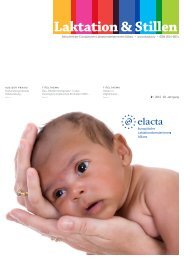Laktation_und_Stillen_2016-3 EN Web p1-10
You also want an ePaper? Increase the reach of your titles
YUMPU automatically turns print PDFs into web optimized ePapers that Google loves.
HANDOUT<br />
Breastfeeding promotes the mother’s<br />
5 health<br />
thereby, the effects of breastfeeding are frequently<br />
dose-dependent. Every year of breastfeeding reduces<br />
the risk of developing breast cancer by 4.3%. The<br />
risk of falling ill with uterine cancer, cervical cancer and<br />
ovarian cancer can also be significantly reduced.<br />
Young children “tank up” on security at<br />
6 their mother’s breast<br />
The instinctive behaviour and the hormones<br />
which mother and child release while breastfeeding, support<br />
the mother-child-bond and promote effective communication<br />
between the two. All of this strengthens the<br />
child’s basic sense of trust.<br />
Breastfeeding during a subsequent<br />
7 pregnancy or tandem breastfeeding<br />
Sometimes a breastfeeding pair is surprised by<br />
a subsequent pregnancy. There are no proven risks for the<br />
mother or the unborn baby if breastfeeding is continued<br />
during a healthy pregnancy. Some mothers complain<br />
about hormone-induced nipple pain and most mothers<br />
notice a decline in the milk production. If the breastfed<br />
baby is still exclusively breastfed, regular weight control<br />
is important. Older children will get the necessary<br />
calories from complementary foods. But it may be that<br />
these children lose interest in breastfeeding during the<br />
pregnancy or the mother decides against continuing breastfeeding.<br />
Even if breastfeeding continues, the milk production<br />
goes through a colostral phase again after birth.<br />
Once the newborn has arrived, the older child can be breastfed<br />
too, provided that the newborn gets the necessary<br />
calories via breastfeeding.<br />
Weaning a young child<br />
8 Breastfeeding is a relationship and, as in every<br />
relationship, both partners have wishes and<br />
needs. It is rare that mother and child want to wean at<br />
the same time. Sometimes the children end breastfeeding<br />
and the mother grieves for it a little. Far more frequently,<br />
however, mothers wish to limit or end breastfeeding. The<br />
planned weaning of an older and self-confident breastfed<br />
child does sometimes require more imagination and certainly<br />
more sensitivity, however, it can also turn out to be<br />
a very positive experience.<br />
Breastfeeding promotes oral health<br />
9 Sucking at the mother’s breast supports the<br />
development of the jaw, promotes the correct<br />
positioning of the teeth and trains the oral muscles. If the<br />
first teeth have broken through, the worry about whether<br />
breastfeeding increases cavities arises. Science does not<br />
provide any clear answers. Possibly, very frequent and, in<br />
particular, night-time breastfeeding can increase the risk<br />
of cavities if there are also other risk factors. With careful<br />
oral hygiene, intact milk teeth can be retained even with<br />
night-time and frequent breastfeeding. Human milk is<br />
low-cariogenic and promotes healthy mouth flora. The<br />
biomechanics of breastfeeding are different than those of<br />
bottle-feeding: When drinking from the bottle, the teeth<br />
have a lot of contact with the milk, while with breastfeeding,<br />
the milk is swallowed directly and scarcely washes<br />
aro<strong>und</strong> the teeth.<br />
Young breastfed children also manage<br />
<strong>10</strong> without Mama sometimes<br />
As a young child grows older and is already eating<br />
solids, the times when he is cared for without the<br />
mother can be expanded little by little without any need<br />
for final weaning. Thus the mother’s return to work, other<br />
enterprises or visitation arrangements are also possible<br />
with a young breastfed child.<br />
Andrea Hemmelmayr, IBCLC<br />
Photo: © Füreder<br />
CONTACT YOUR IBCLC<br />
IBCLC<br />
International Board Certified Lactation Consultants are the<br />
only internationally approved breastfeeding and lactation<br />
specialists having a medical backgro<strong>und</strong>.<br />
The decision to breastfeed or not to breastfeed has shortand<br />
long-term impact on the health of child and mother.<br />
However, breastfeeding sometimes turns out to be difficult<br />
and perhaps professional, competent assistance is needed.<br />
www.elacta.eu Lactation & Breastfeeding 3 • <strong>2016</strong>


